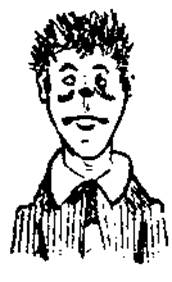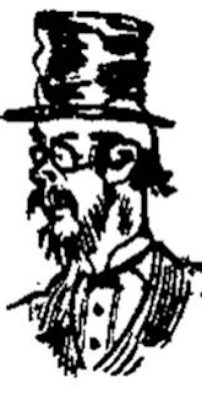This article has been transcribed from a copy of the Cardiff Times in the online collection of scanned Welsh newspapers 1804-1919 in the National Library of Wales, with grateful recognition of the free access accorded to all readers. Paragraph breaks have been introduced for easier reading.
The exchanges retailed here have the flavour of conversation at a gentlemen’s club. The mental habits of the interlocutors seem to be well known. Samuel’s claim that he has ‘a heart for friendship framed’ is expressed by negative reference to a poem by Richard Brinsley Sheridan (1751–1816), the Irish satirist, playwright, poet, and owner of the London Theatre Royal, Drury Lane:
Had I a heart for falsehood framed,
I ne'er could injure you.
Samuel’s variant seems to have been in common circulation. It occurs, for example, in The Squib-Book, being a Collection of the Addresses, Songs, Squibs, and Other Papers issued during the Contested Election at Liverpool, in June, 1818 (see p. 57). Local Boards or Local Boards of Health were local authorities set up in urban areas of England and Wales from 1848 to 1894, following the Public Health Act of 1848. Formed in response to cholera epidemics, they had powers to control sewers, clean the streets, regulate environmental health risks (including slaughterhouses), and ensure the proper supply of water to their districts. — David Skilton

The bore who is always saying – ‘You must not repeat his to anyone.’
told you a few weeks ago, sir, of certain persons who conspired, so far as in them lay, to make my personal existence insupportable. Well, great sir, I did but lay before thee one half of the swelling list – but one tithe of the miseries that I endure at the hands of my fellow men. Let me begin with what I may call ‘The-Know-Nothing’ man. I have no doubt that the reading of the morning papers and the consequent keeping of oneself thoroughly posted in all the news of the day – true and untrue, and often the latter – is not an unmixed pleasure, yet has it become a duty to the educated man, which fact of its being a duty perhaps accounts for its not being altogether a pleasure. Modern conversation is of so desultory – not to say choppy and disjointed – a character that when one starts a theme in an off-hand way, as, for instance, by saying, ‘That was a curious case at Padsey’ – one fully expects that this peculiar case duly noted in all the papers will have come under the observation of those who are addressed in the manner I have spoken of. But, alas and alack, wise sir, how grievous a mistake is this. The know-nothing man is sure to be about. ‘Case,’ says he, ‘case, eh? I've not “heard tell” of it.’ Possibly you ignore this statement, fearing that an explanation may be demanded, and remark to someone else in the company who is conversant with the facts of the case, ‘I can't see what motive could inspire the woman.’ Then does the know-nothing man smoke in silence and yet palpably meditate a question. ‘Well, the other woman in the case might know something of the motive,’ says the man who does know something of the case. The know-nothing man moves his lips slightly and involuntarily, evidently this time resolved to seek an explanation at all hazards. It comes at last. ‘Let's see,’ he says slowly and reflectively, ‘I didn't hear about that; what was it all about?’ Oh dear, oh dear, oh dear! Without even going to the expense or the trouble of buying and reading a newspaper, he expects to be coached by other folks, to the suspension of all other conversation for the time being. Everything has to be explained to him – the most subtle points in the case, which have mayhap taken half a column of printed matter to ventilate, have to be recapitulated with thrice damnable precision before that dreadful man is able to reply to the simple query, ‘What do you think about that case, &?’
Sometimes, to accumulate miseries on miseries' heads, another know-nothing-man comes on the scene when you have got halfway through with the wearisome recital, and then you have to turn back again and begin at the beginning once more. There is literally no coping with this man, save by refusing to explain to him. and telling him to read for himself, for he always puts his theory on the case against your own when you have explained matters to him. If you happened to be a newspaper man, and you remark to him in a snappish sort of way, ‘Why don't you read the papers?’ he will retort, as he thinks with sledge-hammer force, ‘Do you think that I read your lying paper[?]’ (mark how he speaks in the singular, in order to hurt your feelings). It you don't want to be rude to him, sir, the best method is to lay a trap for him. Tell him a long and elaborate lie in a grave sort of way, and as you knew full well that this kind of mail always goes and retails what he has heard in order to appear au fait with all that is going on, ten to one he will soon get the reputation, by retailing you monstrous stories, of being one of the biggest liars (as he is one of the biggest liars) in all creation. When he begins his ‘I haven't heard of that’ formula, tell him lies – that is the only way.

The man who hasn’t read the papers and yet ‘wants to know, don’t you know.’
Another most conspicuous nuisance is the ‘You. know that’ man. Let me explain what I mean. I refer to the person who, whatever the subject of conversation may be, keeps, at short intervals, referring to one for confirmation of his story, about which one has not the faintest prior knowledge, a fact he is fully aware of. ‘I was in Australia at that time,’ he will say; ‘you know that, Samuel.’ Generally speaking, the man who asks for such frequent confirmation is lying, knows that he is, and, with an uneasy consciousness of this, wants someone else to endorse the lie and make it negotiable. He never actually asks you to say that you know it, but he gives you no time to contradict him – all that he really requires is your silent acquiescence. Whenever you meet that man, and can chip in your ‘Don't refer to me; I don't know,’ do so, for the disconcerting effect upon him is something delightful to witness, and productive of any amount of fun. The you-know-that-man chooses well the person to whom he refers – he chooses a mild and inoffensive man not likely to be contradictory.

The youthful bugbear with a thirst for information, who asks such questions as ‘Why is grass green?’
One of the biggest and most torturing of bugbears in the world is the man you have frequent occasion to meet, and who tells the same story over and over again to every mutual friend you happen to jointly mix with. Another most fearful bugbear is the stranger in the train who will insist upon entering into conversation. I do not consider myself a being wanting in geniality (on the contrary, I rather believe that I have a heart for friendship framed), but there are times when I fain would have my quiet reflections (usually addressed to considering how to make a sovereign go as far as 30s.) undisturbed by comments on the weather, prophecies as to the crops, and anticipations as to its being a dry summer. Glare as you will at some men, attempt to discourage them as you may, they will attempt to set the conversational ball a-roiling. This bugbear very frequently insists on pointing out to you the places that he deems of interest along the road, and with a great show of enthusiasm shouts, ‘Look at yond; that's t'new clock at t'Loacal Boord's put up.’ Quite of the same kidney is the bugbear of the play, the man who is so appreciative that he insists on repeating over all the ancient comic wheezes of the funny men, as though he were translating them for people who couldn't understand the chestnuts for themselves. Whilst a musical passage is being played or sung he will softly hum the tune, and, if he be appreciative, will at intervals murmur, ‘Beautiful,’ or ‘Fine, very fine.’

Amongst my other tormentors of the kidney, I might include the man of ‘considerable attainments,’ who takes everything one says literally, and requires an explanation whenever one ventures on a rash expression or opinion; the man who ‘wants to know the why and the wherefore of everything.’ And then in order come those unmitigated bores the man who wishes me to publish ‘good things’ for the paper which he has heard; the man who wishes to send a play to you; the man of serious opinions who harbours ‘religions doubts,’ and wants to make you the recipient of them; the man who has a theory about backing horses, and who luckily (unluckily for himself, though) generally loses when he pursues it, and the man who is always imagining that he has said something to offend you.
Last modified 7 March 2022